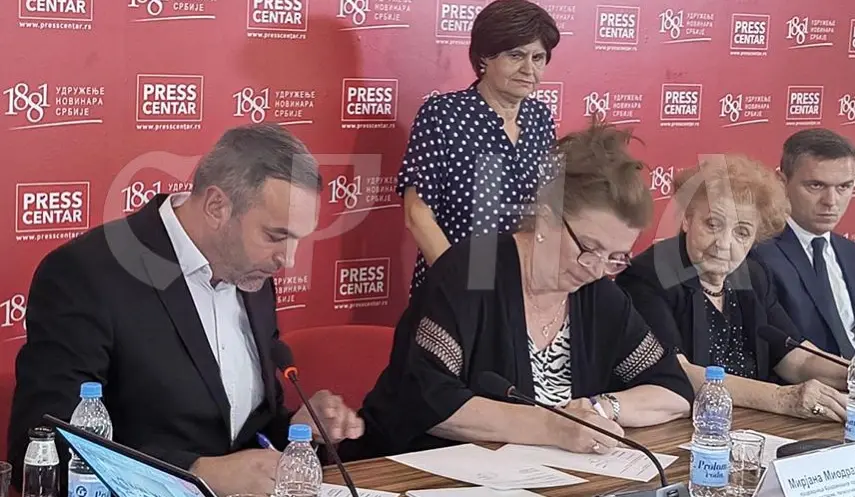BOJIĆ SIGNED MEMORANDUMS OF COOPERATION WITH FIVE WAR VICTIMS' ASSOCIATIONS IN BELGRADE
Serbia - Republika Srpska - cooperation
06/10/2025
18:00

BELGRADE, JUNE 10 /SRNA/ - Acting director of the Republika Srpska Memorial Center Denis Bojić signed today in Belgrade memorandums of cooperation with representatives of five associations of families of killed and missing persons.
It is about the Coordination of Serbian Associations of Families of Missing and Killed Persons from the former Yugoslavia, the Association "Kosmet Victims," and the Association of Families of Kidnapped and Missing Persons in Kosovo and Metohija.
Among them are the Association of Parents and Families of Arrested, Captured, and Missing Persons of the Federal Republic of Yugoslavia and the Center for the Protection of Families of War Victims in Kosovo and Metohija.
The signed memorandums, as stated, confirm the necessity of permanent recording and preservation of data on the suffering of Serbs in the territory of the former Yugoslavia, during the bombing of Serbia, and the pogrom and persecution of Serbs in Kosovo and Metohija.
At a press conference by the Association of Families of Kidnapped and Missing Persons in Kosovo and Metohija held on the occasion of the 25th anniversary of the founding of this association and the 26th anniversary of the adoption of UN Security Council Resolution 1244, Bojić said that the signing of the memorandums of cooperation is part of the joint struggle for the truth about the suffering of the Serbian people in the wars in the territory of the former Yugoslavia.
He emphasized that in achieving this goal, it is necessary to engage not only organizations and institutions but also all individuals, to put the entire Serbian people in a line of defense against historical revisionism, which is the greatest danger.
Bojić recalled that more than 50,000 Serbs were killed or went missing in the wars in the territory of Yugoslavia, and more than 35,000 soldiers and civilians in the territory of Republika Srpska alone.
"Therefore, Republika Srpska has a historical obligation to take upon itself the task of documenting and recording everything that can be recorded, which concerns the suffering of our compatriots," said Bojić.
He stated that, having worked for the past two years at the Public Institution Memorial Center of Republika Srpska, people have realized it is time for Serbian institutions, organizations, and associations to come together in a joint project and create a unified database of recorded testimonies, which will be accessible not only to the Serbian people but to all of humanity.
"Given that it is a complex, extensive, nuanced project in every segment, it is still ongoing, and we hope that it will be available in the database by the end of this year or the beginning of next year," Bojić said.
The president of the Association of Kidnapped and Missing Persons in Kosovo and Metohija, Verica Tomanović, said that there is no progress in the process of searching for missing persons in Kosmet, nor in the investigations into crimes against the Serbian people.
She pointed out that the ethnic cleansing of Serbs in Kosovo and Metohija continues 26 years after the adoption of Resolution 1244, without the consistent application of which reconciliation cannot occur.
Tomanović said that the family members of the missing insist that the search for the missing be a priority in the dialogue between Belgrade and Priština.
"Huge sins were committed against our loved ones, and that's why we will never forget them," said Tomanović.
Suzana Matejić from the Serbian Government's Missing Persons Commission called on the families of the missing not to give up their fight, regardless of all difficulties, because as long as their voice is heard, there is hope that the fate of the missing will be determined.
"It is our duty not to allow the victims to be forgotten. We will continue to be supportive until the fate of the last missing person is determined," said Matejić.
She pointed out that the Commission supports the association's appeal for the depoliticization of the search for missing persons because it is not and must not be a political issue, but primarily a humanitarian one.
The State Secretary in the Ministry of Labor, Employment, Veteran and Social Policy of Serbia, Đorđe Todorov, said that the state will do everything to help the families of the missing, adding that the drafting of a bill on the rights of the families of missing persons is a first step in that direction.
The president of the Coordination of Serbian Associations of Families of Missing and Killed Persons in the Territory of the Former Yugoslavia, Mirjana Miodrag Božin, stated that families of the victims, especially the families of the missing, are constantly given promises, but the processes do not move forward.
She asked when a memorial center for the war victims of the 1990s will be established in Belgrade, noting that Croats in Zagreb and Bosniaks in Srebrenica have such centers, saying that history has shown that those who respect themselves will be respected by others as well.

SERBS IN TEARS AND FEAR OVER OWNERSHIP OF ORTHODOX CEMETERIES AND CHURCHES

CVIJANOVIĆ DEMANDS ACCOUNTABILITY FOR SHAMEFUL CONCERT IN ŠIROKI BRIJEG

OSTOJIĆ URGES BiH AND EU TO ACT OVER GLORIFICATION OF FASCIST IDEOLOGIES





